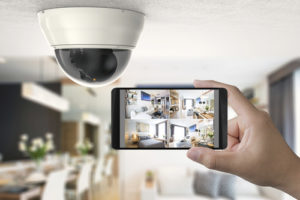We can’t ignore the fact that elder abuse happens, as much as we wish it didn’t. It’s hard to know when it’s happening, especially if your loved one is cognitively impaired. You may have thought about setting up a camera in your loved one’s room. Is that an invasion of privacy, though?

Why You May Want a Camera in Your Loved One’s Room
When your loved one is cognitively impaired, it can be challenging to know what’s wrong. They may complain of pain, but not know what hurts or how it came to hurt.
You see a lot in the news about elder abuse and neglect and start to worry. What if this is more than just a bump or a bruise? How would you know?
That’s where a camera may come in.
Across the US, state legislatures are weighing in on whether or not cameras are the right idea to prevent such problems. The idea would be that you can see how nurses or aids are with your loved one.
To see how they act when they think no one is watching.
In Illinois, New Mexico, Oklahoma, Texas, and Washington, the use of monitoring devices in nursing homes are allowed as long as the resident and roommate agree to it.
Maryland’s guidelines allow cameras only if the community agrees to it.
New York, New Jersey, and Pennsylvania don’t have any laws that govern the use of cameras in homes. Some footage has been used in undercover operations.
People and Groups for Cameras
Nursing Home Monitors launched the Family-Controlled Surveillance Camera Project in 1995. People from this group often go toe to toe with legislators about getting cameras installed in communities.
Most of the time, they are ignored because the nursing home industry is against it.
They even suggested just having cameras in the halls, so families could see who was coming in and out of their loved one’s room. That way, they know how often they get cared for.
That didn’t get very far, either.
In 2017, New Jersey Attorney General Christopher Porrino decided that the state will loan hidden cameras to any family who was worried about elder abuse. The cameras were free for 30 days and disguised as everyday objects.
Invasion of Privacy?
The CEO of the Health and Care Associations of New Jersey, which represents 372 nursing communities and assisted living communities, does not like this idea.
He doesn’t like the idea of cameras being put in so freely. If an investigation is needed, he understands, but he’s worried about false reports.
That’s nothing compared to how residents, roommates, and families feel about having cameras watching them.
Would there be times when the camera is off? Would it catch the abuse or just miss it if it’s not in range? How much of a preventative measure can it be, and is that worth the lack of privacy?
Read more here.

